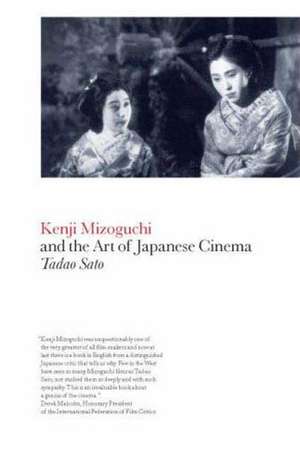Kenji Mizoguchi and the Art of Japanese Cinema
Autor Tadao Sato Editat de Aruna Vasudev, Latika Padgaonkar Traducere de Brij Tankhaen Limba Engleză Hardback – 31 mai 2008
Kenji Mizoguchi is one of the three acclaimed masters--together with Yasujiro Ozu and Akira Kurosawa--of Japanese cinema. Ten years in the making, Kenji Mizoguchi and the Art of Japanese Cinema is the definitive guide to the life and work of one of the greatest film-makers of the 20th century.
Born at the end of the 19th Century into a wealthy family, Mizoguchi's early life influenced the themes he would take up in his work. His father's ambitious business ventures failed and the family fell into poverty. His mother died and his beloved sister was sold into a geisha house. Her earnings paid for Mizoguchi's education. Weak and deluded men, and strong, self-sacrificing women--these were to become the obsessive motifs of Mizoguchi's films.
Mizoguchi's apprenticeship in cinema was peculiarly Japanese. His concerns--the role of women and the realist representation of the inequities of Japanese society--were not. Through two World Wars, Japan's culture changed. Though censored, Mizoguchi continued to produce films. It was only in the 1950s that Mizoguchi's astonishing cinematic vision became widely known outside Japan.
Kenji Mizoguchi and the Art of Japanese Cinema tells the full story of this famously perfectionist, even tyrannical, director. Mizoguchi's key films, cinematographic techniques and his social and aesthetic concerns are all discussed and set in the context of Japan's changing popular and political culture.
Born at the end of the 19th Century into a wealthy family, Mizoguchi's early life influenced the themes he would take up in his work. His father's ambitious business ventures failed and the family fell into poverty. His mother died and his beloved sister was sold into a geisha house. Her earnings paid for Mizoguchi's education. Weak and deluded men, and strong, self-sacrificing women--these were to become the obsessive motifs of Mizoguchi's films.
Mizoguchi's apprenticeship in cinema was peculiarly Japanese. His concerns--the role of women and the realist representation of the inequities of Japanese society--were not. Through two World Wars, Japan's culture changed. Though censored, Mizoguchi continued to produce films. It was only in the 1950s that Mizoguchi's astonishing cinematic vision became widely known outside Japan.
Kenji Mizoguchi and the Art of Japanese Cinema tells the full story of this famously perfectionist, even tyrannical, director. Mizoguchi's key films, cinematographic techniques and his social and aesthetic concerns are all discussed and set in the context of Japan's changing popular and political culture.
Preț: 626.93 lei
Preț vechi: 1060.68 lei
-41% Nou
Puncte Express: 940
Preț estimativ în valută:
119.96€ • 125.51$ • 99.65£
119.96€ • 125.51$ • 99.65£
Carte disponibilă
Livrare economică 12-26 martie
Preluare comenzi: 021 569.72.76
Specificații
ISBN-13: 9781847882318
ISBN-10: 1847882315
Pagini: 224
Dimensiuni: 165 x 17 x 242 mm
Greutate: 0.48 kg
Editura: Berg Publishers
ISBN-10: 1847882315
Pagini: 224
Dimensiuni: 165 x 17 x 242 mm
Greutate: 0.48 kg
Editura: Berg Publishers
Notă biografică
Tadao Sato is one of Japan's most prestigious film critics. He has written on many of the great masters of Japanese cinema--Akira Kurosawa, Yasujiro Ozu, Nagisa Oshima, Shohei Imamura--as well as on Asian and global cinema more generally. He is currently the President of the Japan Academy of Moving Images. Edited by Aruna Vasudev and Latika Padgaonkar. Translated by Brij Tankha.
